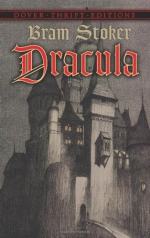3 October.—The time seemed terribly long whilst we were waiting for the coming of Godalming and Quincey Morris. The Professor tried to keep our minds active by using them all the time. I could see his beneficent purpose, by the side glances which he threw from time to time at Harker. The poor fellow is overwhelmed in a misery that is appalling to see. Last night he was a frank, happy-looking man, with strong, youthful face, full of energy, and with dark brown hair. Today he is a drawn, haggard old man, whose white hair matches well with the hollow burning eyes and grief-written lines of his face. His energy is still intact. In fact, he is like a living flame. This may yet be his salvation, for if all go well, it will tide him over the despairing period. He will then, in a kind of way, wake again to the realities of life. Poor fellow, I thought my own trouble was bad enough, but his . . . !
The Professor knows this well enough, and is doing his best to keep his mind active. What he has been saying was, under the circumstances, of absorbing interest. So well as I can remember, here it is:
“I have studied, over and over again since they came into my hands, all the papers relating to this monster, and the more I have studied, the greater seems the necessity to utterly stamp him out. All through there are signs of his advance. Not only of his power, but of his knowledge of it. As I learned from the researches of my friend Arminius of Buda-Pesth, he was in life a most wonderful man. Soldier, statesman, and alchemist—which latter was the highest development of the science knowledge of his time. He had a mighty brain, a learning beyond compare, and a heart that knew no fear and no remorse. He dared even to attend the Scholomance, and there was no branch of knowledge of his time that he did not essay.
“Well, in him the brain powers survived the physical death. Though it would seem that memory was not all complete. In some faculties of mind he has been, and is, only a child. But he is growing, and some things that were childish at the first are now of man’s stature. He is experimenting, and doing it well. And if it had not been that we have crossed his path he would be yet, he may be yet if we fail, the father or furtherer of a new order of beings, whose road must lead through Death, not Life.”
Harker groaned and said, “And this is all arrayed against my darling! But how is he experimenting? The knowledge may help us to defeat him!”
“He has all along, since his coming, been trying his power, slowly but surely. That big child-brain of his is working. Well for us, it is as yet a child-brain. For had he dared, at the first, to attempt certain things he would long ago have been beyond our power. However, he means to succeed, and a man who has centuries before him can afford to wait and to go slow. Festina lente may well be his motto.”




